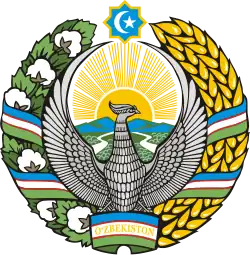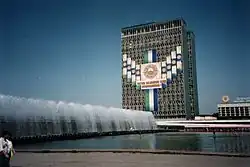Ministry of Finance (Uzbekistan)
Overall
| Iqtisodiyot va moliya vazirligi | |
 | |
 | |
| Taxation and budgeting agency overview | |
|---|---|
| Formed | February 11, 1992 |
| Preceding agencies |
|
| Jurisdiction | Government of Uzbekistan |
| Headquarters | Mustaqillik Maydoni, Tashkent |
| Motto | Financial discipline is the guarantee of development. |
| Minister responsible |
|
| Child agencies |
|
| Website | imv |
The Ministry of Economy anf Finance (Uzbek: Iqtisodiyot va moliya vazirligi) or Ministry of Finance, formed on February 11, 1992, is one of the most crucial government ministry available in the State, responsible for the formulation and implementation of unified state policy in the fields of macroeconomic development, public finance, budgeting, taxation, intergovernmental fiscal relations, public debt management, and state investment policy.
History
Soviet era
The Ministry of Finance of the Uzbek SSR was established in 1924, shortly after the Uzbek Soviet Socialist Republic was created from the remnants of the Turkestan ASSR, Khorezm SSR, and Bukhara SSR. However, it was established as People's Commissariat of Finance with autonomous authority and commission.
It functioned as a republic-level branch of the USSR Ministry of Finance, operating under central directives but managing republican-level financial planning and control. With the outbreak of the Great Patriotic War in 1941, the Ministry of Finance of the Uzbek SSR assumed a critical wartime role, operating under both the Council of Ministers of the Uzbek SSR and directives from the USSR Ministry of Finance in Moscow. During the war, the Ministry radically restructured the republican budget, diverting substantial funds toward:
- Military manufacturing (including textile and machinery production);
- Maintenance and supply of evacuated factories from the western USSR;
- Civil defence infrastructure and air-raid preparedness.
- Capital expenditures were cut drastically; funds were reallocated to defense-related industries.
- Collaborated with the People’s Commissariat of Trade and Commissariat of Food Industry to implement food and goods rationing;
- Introduced and oversaw state ration cards, coupon systems, and material supply plans, especially for urban populations and key workers;
- Monitored local soviets and enterprises to prevent unauthorized spending and misuse of state funds;
- Uzbekistan hosted over 200 relocated enterprises and over 1 million evacuees (including skilled workers, scientists, and artists);
- Organized state loan campaigns (known as "war bonds") to finance the war;
- Encouraged citizens and enterprises in Uzbekistan to contribute to defense loans and patriotic funds;
- Handled accounting and repayment planning for “Goszaim” (state loan certificates) issued during the war years;
- Ensured price controls and monetary stability to prevent wartime inflation;
- Imposed strict financial audits and reporting from all public institutions;
- Reinforced disciplinary inspections to combat fraud, embezzlement, and unauthorized expenditures in wartime supply chains;
Post-war, it became heavily involved in reconstruction, particularly financing new collective farms (kolkhozes), industry, and social housing.
The Ministry worked closely with Gosplan UzSSR (State Planning Committee of the Uzbek Soviet Socialist Republic) to implement Five-Year Plans. It oversaw socialist accounting in enterprises and ensured that enterprises met their financial targets within the planned economy. While nominally a republican body, the ministry was subordinate to All-Union Ministry of Finance, and most fiscal decisions required central approval.
Post-Soviet era
Its presiding and merger organisations were:
- Minister of Finance and Forecasting (1987 - 1990);
- Minister of Finance (1991 - 2022);
- Minister of Macroeconomics and Statistics (1997 - 2004);
- Minister of Economy (2002 - 2018);
- Minister of Economy and Industry (2018 - 2020);
- Minister of Economic Development and Poverty Reduction (2020 - 2022);
Ministers
| Name | Took office | Left office | Notes |
|---|---|---|---|
| Erkin Boqiboyev | 1991 | 1994 | [1] |
| Baxtiyor Hamidov | 1994 | 1998 | [2] |
| Rustam Azimov | 1998 | 2000 | |
| Mamarizo Nurmurodov | 2000 | 2004 | [3] |
| Saidahmad Rahimov | 2004 | 2005 | [4] |
| Rustam Azimov | 2005 | 2016 | |
| Botir Xoʻjayev | 2016 | 2017 | [5] |
| Jamshid Qoʻchqorov | 2017 | 2020 | [6][7] |
| Timur Ishmetov | 2020 | 2022 | [8] |
| Sherzod Qudbiyev | 2022 | 2023 | |
| Jamshid Qoʻchqorov | 2023 | Incumbent |
See also
References
- ^ "БАКИБОЕВ Эркин Жураевич | ЦентрАзия". centrasia.org.
- ^ "ХАМИДОВ Бахтияр Султанович | ЦентрАзия". centrasia.org.
- ^ "НУРМУРАТОВ Мамаризо Бердимуратович | ЦентрАзия". centrasia.org.
- ^ "РАХИМОВ Саидахмад Бориевич | ЦентрАзия". centrasia.org.
- ^ "ХОДЖАЕВ Батир Асадиллаевич | ЦентрАзия". centrasia.org.
- ^ "Djamshid Kuchkarov - Ministry of Finance of the Republic of Uzbekistan". www.mf.uz.
- ^ "КУЧКАРОВ Жамшид Анварович | ЦентрАзия". centrasia.org.
- ^ "Ishmetov Timur - Ministry of Finance of the Republic of Uzbekistan". www.mf.uz.